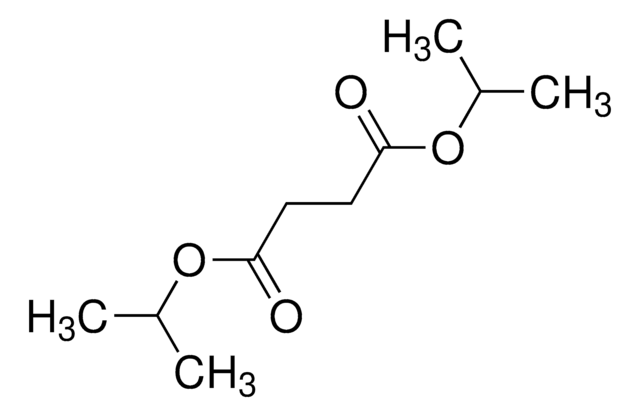W237701
Succinate de diéthyle
≥99%, FCC, FG
Synonyme(s) :
Butanedioate de diéthyle
About This Item
Produits recommandés
Source biologique
synthetic
Niveau de qualité
Qualité
FG
Fragrance grade
Halal
Kosher
Agence
follows IFRA guidelines
meets purity specifications of JECFA
Conformité réglementaire
EU Regulation 1223/2009
EU Regulation 1334/2008 & 178/2002
FCC
FDA 21 CFR 117
FDA 21 CFR 172.515
Densité de vapeur
6 (vs air)
Pureté
≥99%
Indice de réfraction
n20/D 1.42 (lit.)
Point d'ébullition
218 °C (lit.)
Pf
−20 °C (lit.)
Densité
1.047 g/mL at 25 °C (lit.)
Application(s)
flavors and fragrances
Documentation
see Safety & Documentation for available documents
Allergène alimentaire
no known allergens
Allergène de parfum
no known allergens
Propriétés organoleptiques
apple; grape; fruity; waxy; floral
Chaîne SMILES
CCOC(=O)CCC(=O)OCC
InChI
1S/C8H14O4/c1-3-11-7(9)5-6-8(10)12-4-2/h3-6H2,1-2H3
Clé InChI
DKMROQRQHGEIOW-UHFFFAOYSA-N
Vous recherchez des produits similaires ? Visite Guide de comparaison des produits
Description générale
Application
- Impact of indigenous Oenococcus oeni and Lactiplantibacillus plantarum species co-culture on Cabernet Sauvignon wine malolactic fermentation: Kinetic parameters, color, and aroma.: This study explores the co-culture fermentation process in Cabernet Sauvignon wine, focusing on kinetic parameters, color, and aroma. Diethyl succinate was analyzed among the volatile compounds, contributing to the wine′s aroma profile. (Zhang et al., 2024).
- Enhancement of ester biosynthesis in blueberry wines through co-fermentation via cell-cell contact between Torulaspora delbrueckii and Saccharomyces cerevisiae.: The research investigates the role of cell-cell contact in ester biosynthesis during the co-fermentation of blueberry wines. Diethyl succinate is one of the key esters produced, enhancing the aroma and flavor profile of the wine. (Wang et al., 2024).
- Enhancing blueberry wine aroma: Insights from cultivar selection and berry sorting.: This article examines how different blueberry cultivars and sorting methods impact the aroma of blueberry wine, with a focus on the production of aromatic esters such as diethyl succinate. (Wang et al., 2023).
- Comparative analysis of microbial communities and volatile flavor components in the brewing of Hongqu rice wines fermented with different starters.: The study provides a comparative analysis of microbial communities and their impact on volatile flavor components, including diethyl succinate, in Hongqu rice wines fermented with different starters. (Chen et al., 2023).
- Update to RIFM fragrance ingredient safety assessment, diethyl succinate, CAS Registry Number 123-25-1.: This update focuses on the safety assessment of diethyl succinate as a fragrance ingredient, providing comprehensive toxicological data and usage guidelines. (Api et al., 2023).
Actions biochimiques/physiologiques
Code de la classe de stockage
10 - Combustible liquids
Classe de danger pour l'eau (WGK)
WGK 2
Point d'éclair (°F)
208.4 °F - closed cup
Point d'éclair (°C)
98 °C - closed cup
Équipement de protection individuelle
Eyeshields, Gloves, multi-purpose combination respirator cartridge (US)
Faites votre choix parmi les versions les plus récentes :
Déjà en possession de ce produit ?
Retrouvez la documentation relative aux produits que vous avez récemment achetés dans la Bibliothèque de documents.
Les clients ont également consulté
Notre équipe de scientifiques dispose d'une expérience dans tous les secteurs de la recherche, notamment en sciences de la vie, science des matériaux, synthèse chimique, chromatographie, analyse et dans de nombreux autres domaines..
Contacter notre Service technique













